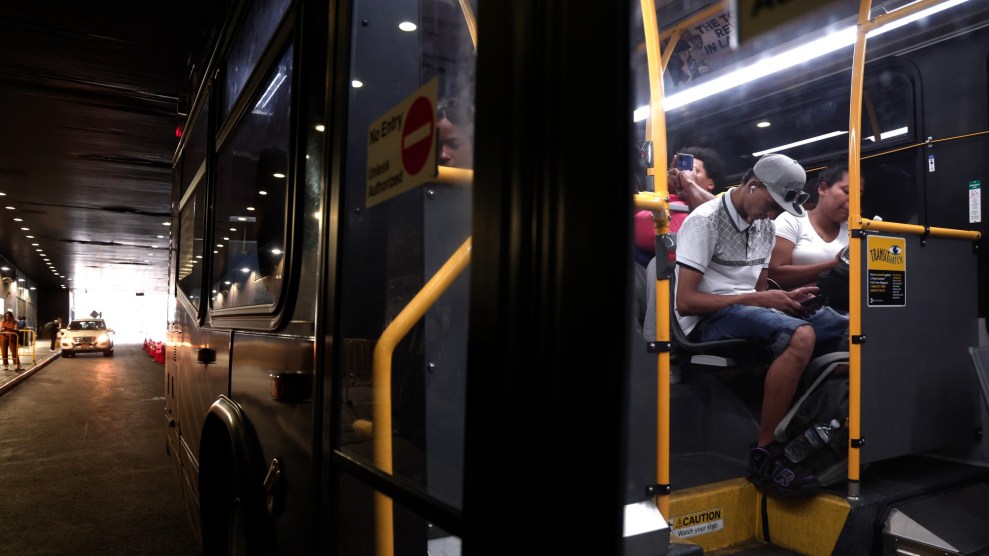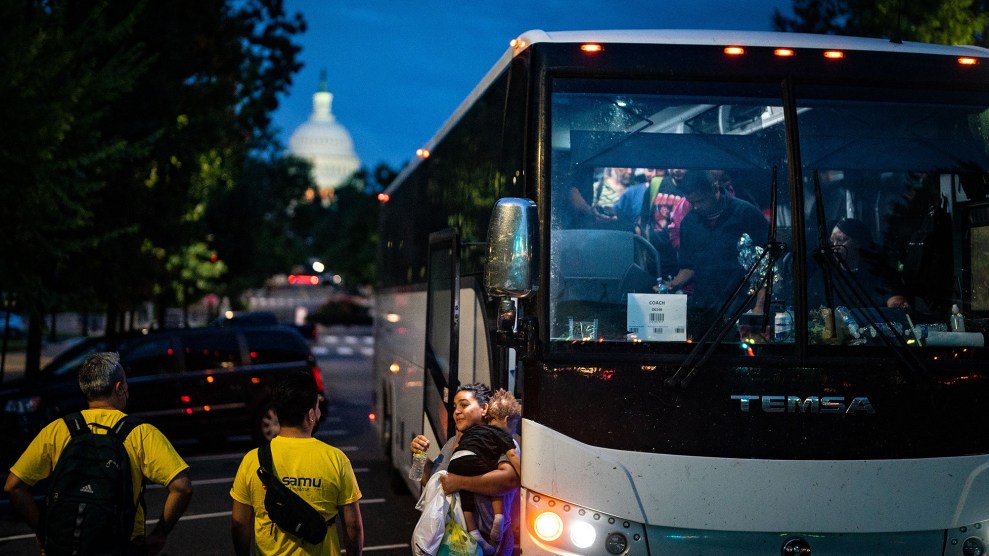
Hyoung Chang/The Denver Post/Getty
On his first day in office in the summer of 2023, Denver Mayor Mike Johnston declared a state of emergency to combat homelessness. He activated the city’s emergency operations center, aiming to place 1,000 people into transitional housing by the end of the year. It was an ambitious goal on its own. But there was also a new wrinkle. A month before Johnston took over as mayor, Gov. Greg Abbott of Texas began busing migrants to Colorado’s capital as part of a campaign to chastise Democrats for what he perceived as “open border” policies.
By the end of the summer hundreds of migrants, mostly from Venezuela, were coming to Denver every day. Johnston, a former school principal and state senator said he soon realized, “we had a really significant crisis.” To date, Denver, with a population of about 700,000, has received almost 40,000 migrants—the most per capita of any city in the country.
It has forced Johnston to make pragmatic but severe decisions. He reinstated limits on how long migrants can stay in shelters and announced cuts to the city’s services to balance the budget. But he has also refused to buy into Abbott’s plot to turn public opinion against migrants. “I want it to be clear to Denverites who is not responsible for this crisis that we’re in,” he said during a press conference last month. “The folks who have walked 3,000 miles to get to this city.”
Overall, Johnston has tried to welcome migrants. And on the federal level, he has pushed for changes to make that easier. He asked the Biden administration to extend Temporary Protected Status (TPS) to thousands of Venezuelan migrants, so they could be eligible for work. The Biden administration did just that last September.
Johnston spoke with Mother Jones about Denver’s approach to migrant arrivals, the bipartisan border deal blocked by Republicans, and why this is a “solvable” crisis:
Texas Gov. Greg Abbott’s political stunt of sending migrants to blue cities across the country had the effect of “interiorizing” the border, leading to responses like New York Gov. Eric Adams’ statement that the “migrant crisis” was going to destroy the city. What do you make of that?
That’s not our belief. We think this is a deeply solvable problem and we think the problem is not attributable to the people who are walking 3,000 miles to try to seek asylum from a country that’s persecuting them and making it impossible to survive.
We think Denver can not just survive but thrive with these newcomers arriving.
We just need a couple of key components. That’s what we pushed the federal government for. We need more work authorization. The biggest problem we have is folks who arrive in the city and tell me, “Mr. Mayor, I don’t want any help, I just want to work.” At the same time, CEOs will call me and say that they have open jobs every day that they can’t fill, and they want to be able to hire the migrants that are here. The only problem is we have the federal government standing in the way of hard-working employees who want to work and employers who want to hire them, and the government’s refusing to let them do that. We need federal resources to help us support people.
And we think there should be a coordinated plan for entry. We don’t think that the governor of Texas gets to decide where every person in America ends up. Whenever we’ve had other waves of asylum seekers, we’ve created a distribution plan that allows them to find cities that have resources. We looked at the examples from Ukrainian refugees or Afghanistan refugees and a coordinated federal response that provided work authorization and resources and connected to cities based on their capacity. We were trying to get at least one of those three things in place. Unfortunately, the bipartisan Senate bill that would have helped do that, President [Donald] Trump and the House Speaker came in to kill, which was an injustice for both our newcomers and for our cities. But we’ve found a path forward despite that and we think there’s still a way to help serve newcomers well and prevent the financial crisis in our city. We’re well on our way to resolving that now.
You recently announced the decision to close four migrant shelters—one a week over the course of a month—as a way to cut costs. What impact does that have on the city’s budget and on the ability to house people?
When the federal legislation failed because of House Republican opposition it left an about $180 million hole in our budget that would have been covered by the relief. We did two things. We looked at how we can reallocate the city budget to help provide services to migrants that were arriving, and ways that we could save money on the migrant program. We have cut about $60 million out of our migrant program, which dropped the total budget gap we have from $180 million to about $120 million. We’re optimistic we have a path to even reduce those costs more significantly. Our belief is this will be a shared sacrifice. It’ll be a balance of how to both support newcomers and provide city services. But we think we’re a city that shares both values. We want this to be a city where we’re not going to let women and children sleep on the streets in 10-degree weather in t-shirts and sandals. We also want to be a city where we can guarantee the public services that every resident deserves. We think we can do both.
In October 2023, you led a coalition of mayors asking for more assistance and funding from the federal government to address the migrant arrivals. What have you gotten and what have you yet to get?
I feel like the White House has been very responsive and helpful. They understand exactly what we need. They’re fighting hard to get those things for us. Obviously, a lot of what we need are more resources. For us to get more work authorization, they need to be able to process asylum claims faster at the border so they can get people approved. The bipartisan Senate bill would have done that.
We need resources for internal cities. The administration pushed for that to get done in the supplemental. The challenge has been a faction of House Republicans who wanted this proposal to die, not because they thought it wouldn’t solve the problem, but because they knew it would solve the problem. Tragically, they were more committed to a chance at electoral success than a chance at serving the American people by delivering results on important issues. That’s what was so frustrating to us. But in Denver we believe our problems are solvable and we believe we’re the ones to solve them. We are not about to be dissuaded by their refusal to help. We have just dug in deeper with our local community and nonprofit partners to find a way forward even without federal help.
The number of migrants currently in city shelters seems to have gone down significantly after a peak in January. What other changes do you expect you will have to make in the near future if the numbers go back up again?
We’ve built a deliberate plan to help decrease that population. We did four things. We reactivated a length of stay policy that requires our newcomers to exit after 14 days if you’re an individual or 42 days if you’re a family. Second, is we increased dramatically our case navigation and support for families helping connect them to housing and jobs. We were able to exit more than 3,000 people over the last five weeks without any significant increase in our homeless population. We also dramatically accelerated workforce authorization; a historic push to provide legal clinics that gave work authorization to people that had CBP One status and could get work authorization immediately. We’re looking at ways to continue to decrease those costs without negatively impacting the newcomers or the city.
There have been reports about the city of Denver reaching out to landlords to rent out properties to migrants. Is that one of the creative solutions you have found to help migrants discharged from shelters find temporary housing and stay out of the streets?
What we’re trying to do is connect them more efficiently and even looking at places where we can use housing to replace our shelter system. It’s much less expensive to pay a month rent for someone in an apartment than it is to have them staying in a hotel every night for 30 nights. We’re looking at ways to get all members of the community involved in helping so that’s landlords, nonprofit partners, community leaders.
You have been a big champion of expediting work permits for eligible migrants. You have also talked about the positive economic impact of migration for cities that have embraced it in comparison to those that historically “bet on being anti-immigrant in their economic strategies.” How can Denver benefit from the migrant arrivals?
We think every great and successful American city has bet on being a city that’s welcoming to migrants. That is literally how those cities have built themselves. We know that, for many estimates, migrants account for up to a third of our economic growth each year. That brings energy and talent to the city. We know that if we want cranes in the air, buildings to be built, restaurants to be staffed, buses to have drivers, us to have officers and service and retail workers—those are all critical roles for Denver’s growth and those are often driven by newcomers to the city who want to be able to make a living for themselves and their family.
There are people around the world that want to move to Denver; we think that’s a great thing.
Other cities in the state have all but closed their doors on migrants and are passing ordinances reaffirming they’re not sanctuary cities. Is it important to you that Denver takes a different stance on this issue?
I do think it’s important for multiple reasons. We are the country that said send us “your huddled masses yearning to breathe free.” We know that there are multiple generations of entrepreneurs and innovators who have built this country, who arrived here as migrants and brought their talents and passion and helped contribute to the splendor of this country. It’s smart not to turn our back on that history in this moment, and not to create and stoke racial or ethnic hatred in a way that is unproductive for the country or the world. We don’t think there’s any benefit to that. The history of cities who have bet on being anti-migrant are cities that have bet against their own economic growth—and that has tanked those cities. The cities that have been able to grow and succeed are ones that have kept their doors open. And we plan to follow in that trajectory.
This conversation has been edited for length and clarity.

















